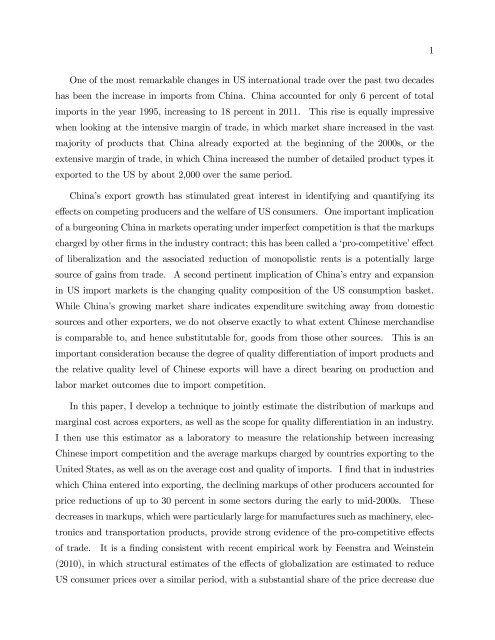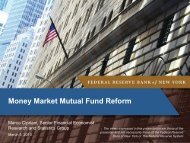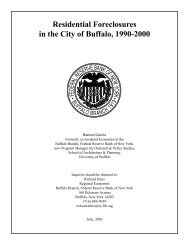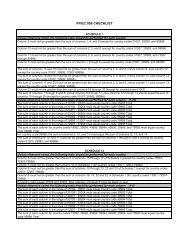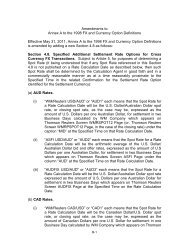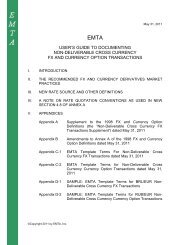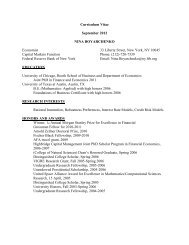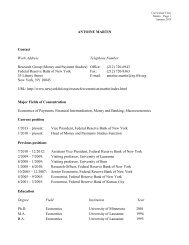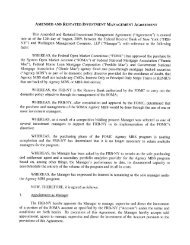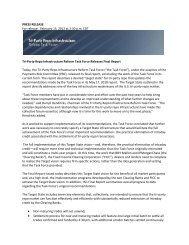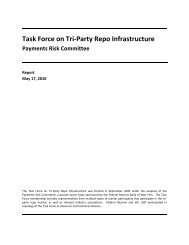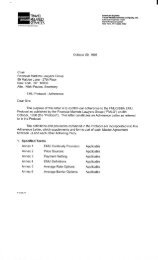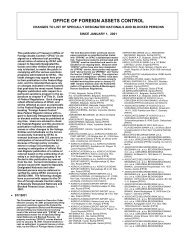Chinese Exports and U.S. Import Prices - Federal Reserve Bank of ...
Chinese Exports and U.S. Import Prices - Federal Reserve Bank of ...
Chinese Exports and U.S. Import Prices - Federal Reserve Bank of ...
You also want an ePaper? Increase the reach of your titles
YUMPU automatically turns print PDFs into web optimized ePapers that Google loves.
One <strong>of</strong> the most remarkable changes in US international trade over the past two decades<br />
has been the increase in imports from China. China accounted for only 6 percent <strong>of</strong> total<br />
imports in the year 1995, increasing to 18 percent in 2011. This rise is equally impressive<br />
when looking at the intensive margin <strong>of</strong> trade, in which market share increased in the vast<br />
majority <strong>of</strong> products that China already exported at the beginning <strong>of</strong> the 2000s, or the<br />
extensive margin <strong>of</strong> trade, in which China increased the number <strong>of</strong> detailed product types it<br />
exported to the US by about 2,000 over the same period.<br />
China’s export growth has stimulated great interest in identifying <strong>and</strong> quantifying its<br />
e¤ects on competing producers <strong>and</strong> the welfare <strong>of</strong> US consumers. One important implication<br />
<strong>of</strong> a burgeoning China in markets operating under imperfect competition is that the markups<br />
charged by other …rms in the industry contract; this has been called a ‘pro-competitive’e¤ect<br />
<strong>of</strong> liberalization <strong>and</strong> the associated reduction <strong>of</strong> monopolistic rents is a potentially large<br />
source <strong>of</strong> gains from trade. A second pertinent implication <strong>of</strong> China’s entry <strong>and</strong> expansion<br />
in US import markets is the changing quality composition <strong>of</strong> the US consumption basket.<br />
While China’s growing market share indicates expenditure switching away from domestic<br />
sources <strong>and</strong> other exporters, we do not observe exactly to what extent <strong>Chinese</strong> merch<strong>and</strong>ise<br />
is comparable to, <strong>and</strong> hence substitutable for, goods from those other sources. This is an<br />
important consideration because the degree <strong>of</strong> quality di¤erentiation <strong>of</strong> import products <strong>and</strong><br />
the relative quality level <strong>of</strong> <strong>Chinese</strong> exports will have a direct bearing on production <strong>and</strong><br />
labor market outcomes due to import competition.<br />
In this paper, I develop a technique to jointly estimate the distribution <strong>of</strong> markups <strong>and</strong><br />
marginal cost across exporters, as well as the scope for quality di¤erentiation in an industry.<br />
I then use this estimator as a laboratory to measure the relationship between increasing<br />
<strong>Chinese</strong> import competition <strong>and</strong> the average markups charged by countries exporting to the<br />
United States, as well as on the average cost <strong>and</strong> quality <strong>of</strong> imports. I …nd that in industries<br />
which China entered into exporting, the declining markups <strong>of</strong> other producers accounted for<br />
price reductions <strong>of</strong> up to 30 percent in some sectors during the early to mid-2000s. These<br />
decreases in markups, which were particularly large for manufactures such as machinery, elec-<br />
tronics <strong>and</strong> transportation products, provide strong evidence <strong>of</strong> the pro-competitive e¤ects<br />
<strong>of</strong> trade. It is a …nding consistent with recent empirical work by Feenstra <strong>and</strong> Weinstein<br />
(2010), in which structural estimates <strong>of</strong> the e¤ects <strong>of</strong> globalization are estimated to reduce<br />
US consumer prices over a similar period, with a substantial share <strong>of</strong> the price decrease due<br />
1


